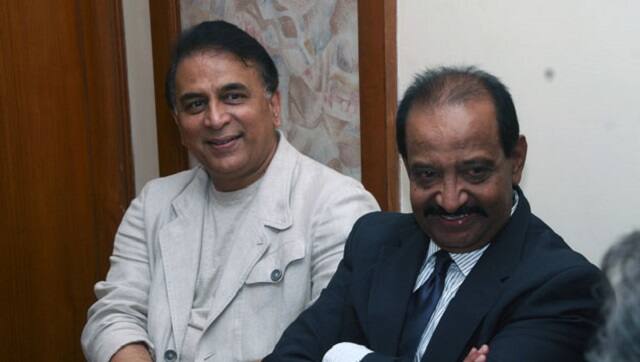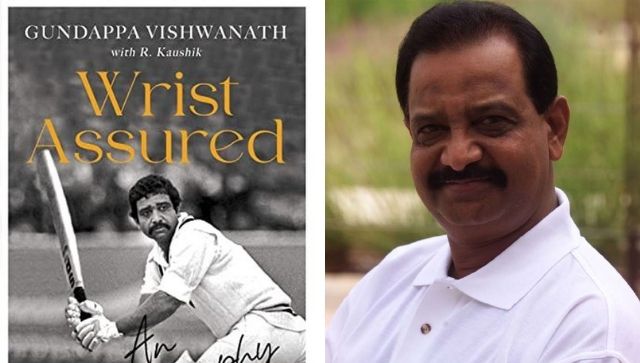Gundappa Vishwanath, former captain of the Indian men’s cricket team, has written a captivating account of his professional journey in collaboration with cricket writer R Kaushik. This book is an invaluable resource for readers who would like to know more about Vishwanath, who received the Padma Shri Award in 1971 and the Arjuna Award in 1977-78. Published by Rupa, it is called Wrist Assured: An Autobiography (2022). The title celebrates Vishwanath aka Vishy’s square cut, his crowning glory as one of India’s finest batsmen. Kaushik was also the co-author of VVS Laxman’s autobiography 281 and Beyond (2018). Vishwanath reveals, “My tryst with the cut began with the tennis ball, which invariably got big on you. I was a slight, thin boy with no power to speak of, and while I did play the drive and the flick, seldom would the ball reach the boundary. The cut…didn’t require me to generate power entirely on my own, I could use the pace of the ball.” Sensing that the square cut had “greater potential to cross the boundary”, he used it to his advantage. He notes, “By a conservative estimate, I reckon more than 4,000 of my 6,080 runs came through the cut.” The book encompasses numerous aspects of the man’s life other than his batting. Vishwanath writes, for instance, about the time he served as the captain. He had not anticipated the honour and the responsibility, so the opportunity was truly humbling. While his stint as a captain was brief (1979-80), it did wonders for his self-confidence. He remarks, “To me, captaincy was the ultimate affirmation of your abilities as a cricketer and a human being.” It seems that Vishwanath took the role quite seriously, instead of letting it get to his head. He outlines his approach as a captain with great clarity: “Captaincy provides insights into players you might not have had access to as a colleague.” He rejects the idea that some people are “born captains”. He believes in experience, hard work and maturing over time. He thinks that a captain should not be “the boss that barks orders” as such a style is quite likely to fail. His captaincy debut was special because it happened at Eden Gardens in Calcutta (now Kolkata). Vishwanath calls it “the ground with the greatest energy and the most infectious atmosphere in the country”. He writes, “Playing in Calcutta lifted your spirits, it galvanised you, and I felt the hair on the back of my neck standing up when, sporting the India blazer, I walked out for the toss on 29 January 1980, alongside my Pakistani counterpart Asif Iqbal.” Vishwanath rubbishes the theory that “batsmen alone make good captains”. In fact, he goes one step further and cites many examples of cricketers who excelled as captains – Kapil Dev, Imran Khan, Bishan Singh Bedi, Richie Benaud, Bob Willis, and Jason Holder – though they were not primarily batsmen. This generosity of spirit can be seen throughout the book. His warm words about friends, colleagues and idols bring the book alive. In addition to Dev and Khan, this list includes Don Bradman, Neil Harvey, Garry Sobers, Rohan Kanhai, Viv Richards, Michael Holding, Andy Roberts, Malcolm Marshall, Polly Umrigar, and Tiger Pataudi, and Wasim Raja. Vishwanath writes, “He (Raja) spent a lot of time in our dressing room and we renewed our association after our playing days when we both became ICC match referees. His demise (in 2006) came as a shock and left me in grief for a long time.” The book includes a charming anecdote from the time when Pataudi invited Vishwanath to join him on a vacation in Ooty. Pataudi was already married to film actor Sharmila Tagore by then. Pataudi said, “You know, my wife is shooting for a film in Ooty, the shoot is in the final stages. Once she finishes up in a couple of days, we will all come back together.” In the book, Vishwanath recalls how nervous and excited he was to hear this because he was a big fan. What was meant to be a three-day vacation went on for 15 days. Vishwanath loved it because he was treated like royalty. He remembers the routine that he and Pataudi had settled into: “Wake up late, a leisurely breakfast, another nap. Then gin and lunch. Afternoon siesta. We’d wake up in the evening, play some table tennis, dive into a bottle of whiskey, finish up with a very late dinner. It was the ultimate definition of the word ‘holiday’!” It was all new to him. If Tagore’s presence was not enough, Vishwanath was stunned to find actor Rajesh Khanna visiting them. He was not shooting for any film. He was just getting away from urban life. Vishwanath was happy to see that they did not have any starry airs. They were genuinely interested in his work. Later, Khanna attended Vishwanath’s wedding to Gavaskar’s sister. [caption id=“attachment_10706921” align=“alignnone” width=“640”] Sunil Gavaskar and G Viswanath[/caption] Another funny story is about Vishwanath’s first meeting with Benaud. He was annoyed when he heard Benaud constantly refer to him as ‘Vishnawath’. Eventually, he found a hilarious solution to the problem. When Gavaskar introduced him to Benaud as “Vishy”, Vishwanath said, “Nice to meet you, Mr Bednau.” The man said, “My name is not Bednau, it’s Benaud.” He got a quick rejoinder. “And I am Vishwanath, not Vishnawath.” Benaud was not upset. He approached Vishwanath with a big smile and said, “Beauty, that was brilliant, I like you!”
Sunil Gavaskar and G Viswanath[/caption] Another funny story is about Vishwanath’s first meeting with Benaud. He was annoyed when he heard Benaud constantly refer to him as ‘Vishnawath’. Eventually, he found a hilarious solution to the problem. When Gavaskar introduced him to Benaud as “Vishy”, Vishwanath said, “Nice to meet you, Mr Bednau.” The man said, “My name is not Bednau, it’s Benaud.” He got a quick rejoinder. “And I am Vishwanath, not Vishnawath.” Benaud was not upset. He approached Vishwanath with a big smile and said, “Beauty, that was brilliant, I like you!”
These behind-the-scenes moments give the book an intimate, grounded feel. Not all of these show Vishwanath in a positive light but they do construct a complex picture of his life.
His relationship with Gavaskar finds a significant place in the book. Vishwanath recalls a time when he was quite unwell and, therefore, hospitalised. Gavaskar asked him to give up drinking. Apparently, he said, “Vishy, you have fought it out for India on the cricket field so many times, you have come out with flying colours in a crisis and won so many games for India. For you, this is nothing. You can easily stop this and win the fight for your family.” This heartfelt appeal shook Vishwanath. Gavaskar was speaking not only as his friend and colleague but also as the brother of Vishwanath’s wife Kavita and the uncle of Vishwanath’s son Daivik. Vishwanath writes, “Sunil had never asked me for anything all these years. I spent a couple of sleepless nights; I couldn’t get his words off my mind.” Gavaskar managed to accomplish what doctors could not, and what Vishwanath’s wife and child had failed to do. Vishwanath writes, “There was, however, a different kind of impact in what Sunil had said and how he had said it. I decided that was it. I haven’t had a drop of alcohol since.” Through this book, you will also learn about the beginnings of Vishwanath’s career in Mysore, his employment with the State Bank of India, his “inveterate” love for dogs, his memorable tour to Pakistan in 1978, how he felt when he was dropped from the West Indies tour right after Pakistan, what his family means to him, and life after retirement as referee, selector and coach. Vishwanath is 73 years old now. It has been a long and fruitful innings. Chintan Girish Modi is a journalist, commentator, and book reviewer Read all the Latest News , Trending News and Entertainment News here. Follow us on Facebook , Twitter and Instagram .
)